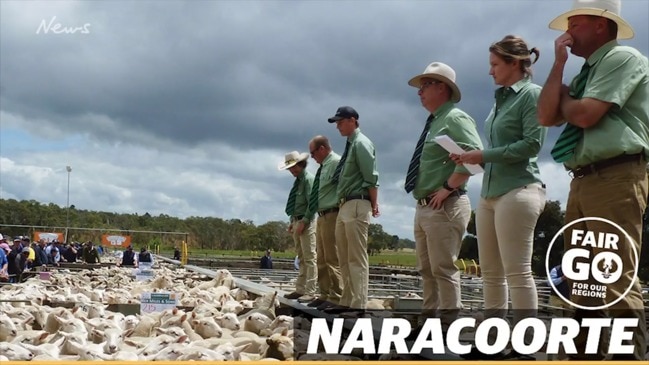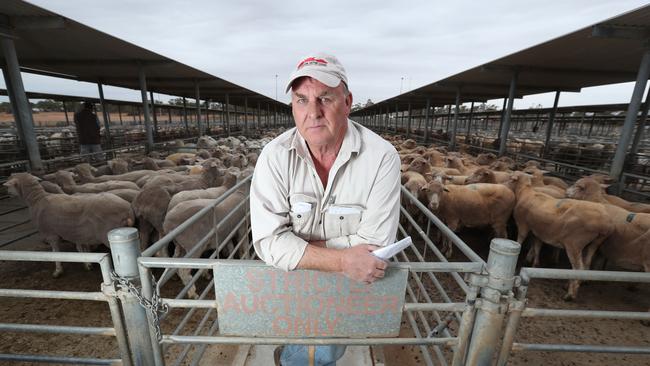Coronavirus causes livestock industry to explore new ways to get produce to consumers
Think the meat section at your local supermarket is looking bare? The livestock industry is working through new ways of business to keep supply up.

SA Business
Don't miss out on the headlines from SA Business. Followed categories will be added to My News.
Booming meat sales have helped make South Australia’s livestock sector one of few winners in the virus crisis.
Butchers are reporting a lift in trade by 300 to 400 per cent and online delivery sales for fresh meat across Australia have risen 65 per cent.
Livestock prices have also reached record levels and a pen of lambs sold for $348 a head at the Dublin saleyards.
By comparison, in May last year, SA lamb prices records were also being set at Dublin, but at $300 a head.
As consumers snap up meat supplies in record amounts, evident by near empty supermarket shelves, the livestock sector has had to adapt the way it does business to keep up with the demand.
Jason Mathie, who owns Mathie’s Meat Shoppe in Clare, has been selling 800kg of mince a week – three times his usual trade.
“It’s been bigger than Christmas and Easter put together,” he said.
“While a lot of people are being laid off in many industries, we’re doing 15-hour days to keep up with the demand.”
The number of cattle sold at Mount Compass has doubled.
About 1650 cattle were sold at one auction at the end of March, compared with the usual weekly figure of about 850.
Scott Endersby, whose family runs livestock saleyards at Mount Compass and a butcher’s shop in the town, said cattle prices remained consistent despite the extra sales.
He said his butcher shop Meat at the Mount had never been busier.
“We’ve been flat out at the shop – we’re doing in excess of three times our normal trade,” he said.
“Luckily, we have a lot of cattle available so we’ve been able to keep up with supply.
“While we’re very busy, it hasn’t necessarily been locals buying up. We’ve had a lot of people come from Adelaide to buy.
“I actually had an order come in from Melbourne and I had to explain we’re based in South Australia.”

Gumeracha Gourmet Meat owner Doug Costello closed the doors of his Adelaide Hills shop three weeks ago and moved solely to home deliveries.
“My partner is due to have a baby in three weeks, and I have a lot of older customers, so I decided to shut the shop,” he said.
“Since the shop closure, demand for the home-delivery service has proven very strong.
“I’ve gone as far as Old Reynella, Mannum and Kapunda.
“It’s been ridiculously busy, but for me it’s not about making money at the moment, it’s about keeping the business going and getting people what they need.”
Bruce Meat’s owner Trevor Hill, who runs butcher shops across Adelaide, said massive demand for mince and sausages – products generally made from lesser-quality cuts – meant there were also good bargains of higher-quality cuts.
T-bone steaks that had sold for up to $38 a kilogram were available for $19.99 a kilogram.
A drop-off in restaurant trade has played a key role in the reduction of prices for premium cuts.
Australian Meat Industry Council chief executive Patrick Hutchinson said he had heard some butchers having up to four times their usual trade.
“I’ve also heard of one business that went from having $10,000 of delivery sales a week to now having $80,000 a week,” he said.
Meat & Livestock Australia managing director Jason Strong said retail sales had more than compensated for a drop in sales to the food-service trade.
“The comments coming in from retailers were that March sales were just like Christmas sales,” he said.
Mr Strong said sales data from the four weeks to the end of February showed online sales of fresh meat rose 65 per cent on the previous month.
Meat & Livestock data also shows 4764 head of cattle were processed in South Australia last week, a 14 per cent increase on the week before and a 19 per cent lift on the previous year.
Mr Strong said while there was no doubt there would be volatility in the meat market through the coronavirus crisis, the underlying market fundamentals were strong.
MORE NEWS
Fears for South East health services as Rex cuts flights
Irrigators warned of low allocations
“This is a new world – we’ve never been here before,” he said.
“I don’t think anyone can predict what’s going to happen next but the global underlying drivers for the red-meat industry are still positive.
“We still have an increase in global demand.”
Andrew Lepley, who manages sheep and cattle saleyards at Dublin, said yards were operating with a skeleton staff and without farmers in attendance.
“We probably only have 30 people at the yards, compared to 100-plus normally,” he said.
A Woolworths spokesman said there was an incredible level of demand for groceries – including meat.
A Coles spokesman said customer demand for meat had increased “astronomically” over the past month.
